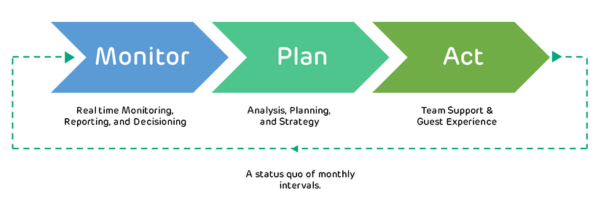Advanced Energy Saving in hotels – wisely cutting costs and carbon with real-time decisioning
Energy is a key cost and emissions factor for hotels, resorts, and timeshares, as they are high
energy intensive buildings which operate 24/7. Even though cleaner and more efficient
equipment has made vast improvements, rising temperatures and energy costs require
continuous effort to avoid wasteful operations and further emissions.
You might have recently undertaken an energy audit (likely for ISO 50001) and made
appliance changes including replacing equipment or installing renewable energy systems,
both of which are excellent advances. The problem with these changes is that you still
consume in the same way as before, which means you are likely wasting significant amounts
of energy that you don’t even know about.
Imagine we’re playing a game of cards, but I haven’t taught you the rules and there is no way
to keep track of the score. We’re playing constantly for a month, between every meal,
between your work emails, and I’m even playing whilst your out of office. At the end of the
month, I send you a scoresheet showing that you lost, and now you owe me money as
winnings. That is today’s status-quo with electricity monitoring and how we receive our bills or
carbon statements. It’s quite a challenge to win in this situation, or even try and improve, isn’t
it?

Accessing great live data is vital in seeing the trends and usage as they happen and taking
action to prevent wastage. The issue is that there is already a lot of live data, probably
monitoring the HVAC, hot water, lighting, lifts, and corridors – but these are almost always
separate from each other, confined to electricity only, and even then – ‘so what’? It is nearly
impossible to get an understanding of what is actually going on as the data is disconnected
and just displaying numbers, not trends, or actions to take.

Real-time decisioning combines live data and analytics with a property’s decision making
using a detailed focus on prioritizing tangible operational value. So that collecting data from
multiple sources so you don’t need to be moving from one system to another, especially hard
when under time and labour resource pressures.
The phrase that data “is the new gold” (Deloitte) is questionable. Everyone, especially in
hospitality management, is incredibly busy, including engineers who have to focus on the realities of running a 300-room hotel with basic but critical guest service needs (the replacing
of a blub or fixing an a/c) with little time for analysis of data. We need much more than data –
we need intelligent systems that are integrated and inform key roles within a building.
The benefits of real-time decisioning are:
- Immediate actions – It is the action you take from a decision that creates value. Data,
analytics and advanced automated systems do not deliver meaningful value without
the benefits of taking relevant decisions. Today’s sustainability goals require value to
be created from transparent reporting to avoid ‘Greenwashing’ to intelligently guiding
operations to minimise the property’s footprint. - Predicting actions – Operations in a hotel are continuous 24/7/365. Using real-time data
enables a hotel to predict events before they happen using contextual real-time data to
spot events and ‘decision windows’ to take action. For example, occupancy numbers
and closing spa/pool facilities. - Prioritisation – Not all decisions need to be made in real-time. It is important you
understand the decision time constraints and frequency of time available in a
hospitality environment to determine when and how real-time decisioning can be
made. For example, refinements to overnight operations. - Constant updates – Taking action in an appropriate manner is key. This is a balance
between the type of decision required and the speed of analysis. It also must take into
consideration the last responsible moment to take action so that you have complete
information and not making the decision prematurely. For example, the impact from
extreme weather events and taking preventative action for energy saving and the
health of staff and guests. - Opportunity to learn – Real-time decisioning is about recognising the balance between
automation and the benefit of human involvement for risk-reward assessment so you
know you have made the right decision. For example how best to motivate kitchen staff
to save. - Deeper insights – When making a decision you may seek the data for that purpose. The
emphasis is on what data is needed to create value. Delving into data already collected
can provide a great second source providing additional insights if the right questions
are asked. For example planning renovations and enquiring on the difference between
sun/shade facing guests rooms and when is required for optimal thermal efficiency. - Additional information – Data should be provided in a form that augments decision
making rather than replacing human intervention, building on the skill of engineers and
hospitality managers. For example, identifying the different behaviours of guests and
consumption levels by season which could lead to changes in energy use for comfort,
lighting, lift use etc. - Turning data into insights – Real-time decisioning requires systems to predict, detect,
and respond to events so empowering your decision making. Quality not quantity of
data is important so one does not have information overload and do have the clarity to
enhance decision making. For example assessing if all hot water boilers are required.
A WISE solution for hoteliers, engineers, and sustainability managers
We design and create intelligent solutions for tourist accommodation that integrate systems
to save energy and reduce carbon; informing managers, motivating staff, and encouraging
guests to conserve resources around the clock. Our solutions predict, alert, and recommend
action across the operations to improve energy performance, the guests’ experience, and
business sustainability performance… continuously


